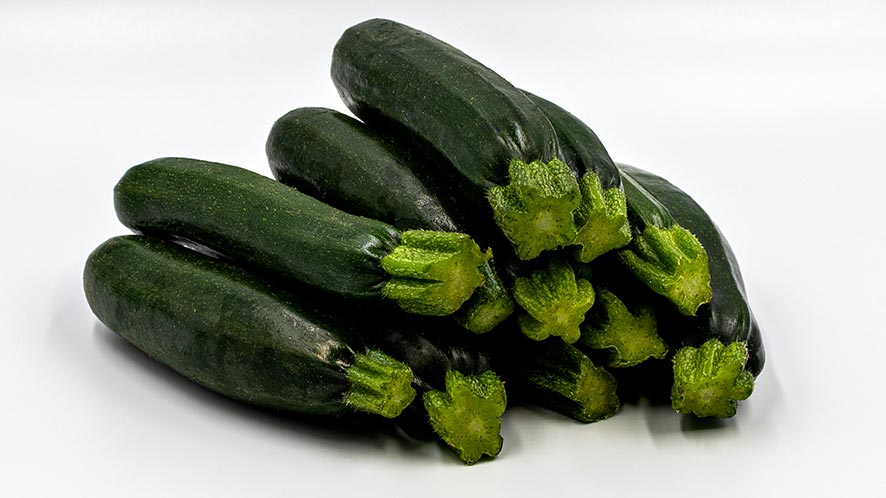Zucchini Nutritional Value and 8 Health Benefits
Zucchini, also known as courgette, is a summer squash that belongs to the family of Cucurbitaceae plants, which also includes pumpkins, watermelons, and cucumbers. Originating in Mexico and Central America, zucchini became popular in the rest of America and was eventually introduced to the rest of the world.
Today, it is cultivated worldwide with the United States, China, India, and Russia being among the leading producers. Known for its delicate flavor, soft shell, and white flesh; it is botanically a fruit but is treated as a vegetable when cooking.
Apart from that, zucchini is low in fat and calories and high in other nutrients, which puts it on the list of highly nutritious and beneficial food items. If eaten on a regular basis, the nutrients present in zucchini provide the body with wonderful health benefits. Go through the following section to learn about the nutritional value of zucchini and the health benefits it provides.
Zucchini Nutritional Value and Facts
Amount of Zucchini: 1 cup, (raw, chopped, skin included)
Total Weight of Zucchini: 124 gm
| Nutrients | Amount |
| Basic Components | |
| Proteins | 1.5 g |
| Water | 117 g |
| Ash | 0.8 g |
| Calories | |
| Total Calories | 19.8 |
| Calories from Carbohydrates | 14.3 |
| Calories from Fats | 1.9 |
| Calories from Proteins | 3.7 |
| Carbohydrates | |
| Total Carbohydrates | 4.2 g |
| Dietary Fiber | 1.4 g |
| Sugar | 2.1 g |
| Fats & Fatty Acids | |
| Total Fat | 0.2 g |
| Polyunsaturated Fat | 0.1 g |
| Total Omega-3 Fatty Acids | 58.3 mg |
| Total Omega-6 Fatty Acids | 34.7 mg |
| Vitamins | |
| Vitamin A | 248 IU |
| Vitamin C | 21.1 mg |
| Vitamin E | 0.1 mg |
| Vitamin K | 5.3 mcg |
| Vitamin B6 | 0.3 mg |
| Thiamin | 0.1 mg |
| Riboflavin | 0.2 mg |
| Niacin | 0.6 mg |
| Folate | 36 mcg |
| Pantothenic Acid | 0.2 mcg |
| Choline | 11.8 mg |
| Minerals | |
| Calcium | 18.6 mg |
| Iron | 0.4 mg |
| Magnesium | 21.1 mg |
| Phosphorus | 47.1 mg |
| Potassium | 325 mg |
| Sodium | 12.4 mg |
| Zinc | 0.4 mg |
| Copper | 0.1 mg |
| Manganese | 0.2 mg |
| Selenium | 0.2 mcg |

Health Benefits of Zucchini
- Zucchini is a low-calorie food, which means it is a great way of feeling full without storing too many calories that are impossible to burn. A little over a hundred grams of raw zucchini contains just about 20 calories. Moreover, the dietary fiber present in zucchini prevents constipation and maintains low blood sugar levels.
- This dietary fiber in zucchini also helps lower cholesterol levels by combining with the bile acids (produced by the liver by extracting from the cholesterol). In addition to this, the high content of vitamin A and vitamin C prevents the cholesterol from oxidizing into the blood vessels and thereby, preventing the risk of atherosclerosis.
- The risk of various types of cancers is also lowered by including zucchini in your regular diet. It’s the dietary fiber that prevents the carcinogenic acids from setting in the colon, by promoting healthy and regular bowel movements, and vitamins such as A, C, and folate act as powerful antioxidants and fight oxidative stress.
- According to the studies, the phytonutrients in zucchini promote prostatic health by lowering the symptoms of benign prostatic hyperplasia (BPH), a condition in which the prostate gland enlarges and leads to complications such as frequent and painful urination, and increased risk of urinary tract infections.
- Zucchini is rich in nutrients such as vitamin A, vitamin C, copper, and many other powerful antioxidants and anti-inflammatory agents that prevent the development of many inflammatory disorders like asthma, osteoarthritis, and rheumatoid arthritis.
- Regular consumption of zucchini also leads to a lower risk of heart attack and stroke. It’s the magnesium content present in zucchini, along with folate, that does the needful by breaking down the dangerous amino acid homocysteine, a high level of which can lead to heart attack and stroke.
- Magnesium, along with potassium, present in zucchini helps lower blood pressure, thereby reducing the risk of hypertension, damage to blood vessels, heart attack, and many other medical conditions.
- Zucchini is also rich in manganese, an indispensable nutrient that helps the body metabolize proteins and carbohydrates and speeds up the synthesis of fatty acids and cholesterol. Manganese also promotes proper wound healing by producing proline and amino acids.
With the nutritional value of zucchini in your sight, don’t wait any longer to include zucchini in your diet. It can be boiled, steamed, grilled, stuffed, baked, barbecued, or fried, and can also be included in other mouth-watering recipes (search the internet or consult a cookbook).
Embracing Zucchini’s Nutritional Power
Zucchini, a versatile summer squash, delivers not only a delicate taste and soft texture but also a powerhouse of nutrients. Its origins trace back to Mexico and Central America, but its popularity has soared globally, finding its way into kitchens and cuisines worldwide. Recognized for its low calorie and fat content, zucchini stands tall as a nutritious addition to any diet. Unveiling its nutritional profile and health benefits sheds light on its value as a dietary staple.
Nutritional Bounty of Zucchini
A mere glance at the nutritional content of zucchini showcases its impressive profile. Laden with vitamins A, C, E, and K, along with an array of essential minerals such as calcium, potassium, and magnesium, it boasts a low-calorie count and high water content. Its amalgamation of proteins, carbohydrates, and fats, while modest, renders it a significant source of dietary fiber, vital for digestive health and overall well-being.
Health Triumphs of Zucchini
The merits of incorporating zucchini into one’s diet transcend mere sustenance. Its dietary fiber content not only aids in satiety but also champions digestive health, curtailing constipation and stabilizing blood sugar levels. Moreover, this fiber’s ability to bind with bile acids assists in lowering cholesterol levels, fortifying cardiovascular health, and staving off atherosclerosis.
Combatting Ailments with Zucchini
Beyond its role in cholesterol management, zucchini emerges as a formidable ally against cancer. The interplay of dietary fiber and potent antioxidants like vitamins A, C, and folate combats carcinogenic acids, safeguarding against colon-related cancers. Notably, its phytonutrients contribute to prostatic health, mitigating symptoms associated with benign prostatic hyperplasia.
Shielding Against Inflammation and Cardiovascular Risks
Zucchini’s nutrient profile, encompassing antioxidants and anti-inflammatory agents, serves as a bulwark against inflammatory disorders like asthma and arthritis. Magnesium, a key constituent, synergizes with folate to thwart the perils of elevated homocysteine levels, thereby mitigating risks of heart ailments and strokes. The amalgamation of magnesium and potassium further aids in regulating blood pressure, reducing the specter of hypertension and associated complications.
Unveiling Zucchini’s Potential
Manganese, nestled within zucchini, emerges as an indispensable nutrient, contributing to metabolic processes and expediting wound healing. Its multifaceted benefits make zucchini an invaluable addition to daily culinary ventures. From boiling and steaming to grilling and baking, the versatility of zucchini unlocks a myriad of culinary adventures, enriching various recipes and taste experiences.
The nutritional treasure trove housed within zucchini extends an invitation to embrace its virtues and weave it into the fabric of everyday meals. Whether exploring traditional recipes or concocting innovative culinary delights, the inclusion of zucchini ensures not just gastronomic delight but also a reservoir of health benefits. So, without further ado, let the journey to a healthier, more flavorful lifestyle commence with the incorporation of this humble yet extraordinary squash.
